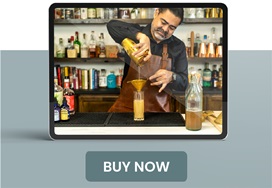In the previous article, we talked about some of the types of bar apprenticeships available to bartenders. While there are not many examples of “textbook” apprenticeships in our industry, there’s no shortage of ways to learn a new set of skills.Whether you work a guest shift here and there, seek out a stage, or apply to be the boots on the ground for a massive cocktail conference, you’re taking part in the tradition of apprenticeship.
In this portion of our exploration of apprenticeship, we’ll be looking at how to set your career on that fast track by finding apprenticeship opportunities that align with your career goals.
The Basics: Choosing a Path
Before you hit the pavement looking for an apprenticeship of your own, it’s worth taking a moment to step back and think about your goals. What are your professional and personal aspirations? Do you want to win mixology competitions or own a local dive bar someday? Your path forward will depend heavily on where you want to end up.
Planning is a huge part of the process, agrees bartender and St. Germain Brand Specialist Amanda Carto. Hailing from Austin, TX, Carto is a two-time Cocktail Apprentice at Tales of the Cocktail and is manager for the Prep Crew at San Antonio Cocktail Conference.
“Set clear, achievable goals with a time frame,” says Carto, “whether it be a week, a year, three years or a decade. You are allowed to edit these goals as you continue your journey. Always be kind to yourself and be kind to others along the way.”
As Carto suggests, don’t get bogged down in the details. You can always change your goals and direction as you learn more about yourself, your preferences, and your industry.
As you outline your goals, look for patterns. These will help establish the best apprenticeship route for you. Your focus will often dictate the people you seek out or befriend. Be careful of walking a path that’s too narrow. Staying open to new ideas and styles of service keeps your options open, whether you’re repping spirits, shaking Daiquiris or slinging beer.
Setting the Stage
If you have your eyes on a prize like a night of service at Aviary or another top-shelf destination, coming correct is a top priority. You’re not only representing yourself, but you’re representing your home bar and market.
For some, a stage may be as easy as contacting the Beverage Manager at a sister restaurant. Many restaurant families have multiple concepts with varying levels of service. If you happen to work in a restaurant group that has a beverage program you’re curious about, schedule a meeting with your manager and start the process. Not only does it give you some of the knowledge you’re looking for, but it helps acquaint you with some of the systems being used at sister restaurants. Additionally, the intimidation factor is diminished if the person overseeing your stage is someone you already know.
If you’ve cultivated good relationships around your city, asking for a few hours of instruction behind someone else’s bar is often an easy order to fill. Many are happy to teach what they have learned, and having a new face behind the bar can break up the monotony of a mid-week shift. Additionally, at the end of a successful stage, you’ve either landed a job or cast yourself as someone to call should a position open up.
Cultivating this same work ethic and goodwill when reaching out to bars on a national or even international level will not only help get you what you want, but expands the potential for future career moves.
If you’re reaching out to a place you have no prior relationship with, work the appropriate channels. Treat these interactions as you would any job interview. Emails and phone calls should be professional and succinct. If you’re looking to your own social network to help make a connection, remember to pay these kinds of favors forward.
Guest for Success
While usually more informal than a stage, treating the experience of a guest shift with the same reverence and effort is a great investment in your future.
Start with asking around town if someone needs a free set of hands. It’s not only a great way to make some quick beer money, but it helps build your reputation as a utility person, a jack of all bars. Being willing to take on duties such as barback shifts also shows humility and helps keep bartenders grounded.
Some bartenders will take time off in between steady jobs and work a series of guest shifts to keep their skills sharp while learning new ones. When it comes time to pick a new bar to call home, they have a much better idea of their strengths and weaknesses. More importantly, they have a strong idea of the style of service and bar they most enjoy.
As a guest bartender, the real currency you earn is the experience. Being able to work a variety of levels of service or handle different styles of bartending keeps your options wide open. When bar managers are having trouble covering shifts, it’s the proven guest bartender that’s on the top of the call list.
Being known as a utility bartender can help when it comes to travel as well. A few well-placed emails or calls and you can set up a few guest shifts to help defray the cost of travel. Not only is this a great way to make connections in new markets, but it also exposes you to new backbar strategies, drink styles and products.
An email or phone call with a quick introduction and timetable will help get the ball rolling. As you grow your professional network, these conversations can become easier and less formal. That said, it’s important to never take the opportunities you’re yielded for granted. If you’re not a good guest, you’re making yourself and your market look bad, and it’s unlikely you’ll be invited for a return engagement. At the end of the day, bars are a business, and while these experiences can be enjoyable, remember to enjoy yourself in a professional fashion.
Setting the Stage
If you have your eyes on a prize like a night of service at Aviary or another top-shelf destination, coming correct is a top priority. You’re not only representing yourself, but you’re representing your home bar and market.
For some, a stage may be as easy as contacting the Beverage Manager at a sister restaurant. Many restaurant families have multiple concepts with varying levels of service. If you happen to work in a restaurant group that has a beverage program you’re curious about, schedule a meeting with your manager and start the process. Not only does it give you some of the knowledge you’re looking for, but it helps acquaint you with some of the systems being used at sister restaurants. Additionally, the intimidation factor is diminished if the person overseeing your stage is someone you already know.
If you’ve cultivated good relationships around your city, asking for a few hours of instruction behind someone else’s bar is often an easy order to fill. Many are happy to teach what they have learned, and having a new face behind the bar can break up the monotony of a mid-week shift. Additionally, at the end of a successful stage, you’ve either landed a job or cast yourself as someone to call should a position open up.
Cultivating this same work ethic and goodwill when reaching out to bars on a national or even international level will not only help get you what you want, but expands the potential for future career moves.
If you’re reaching out to a place you have no prior relationship with, work the appropriate channels. Treat these interactions as you would any job interview. Emails and phone calls should be professional and succinct. If you’re looking to your own social network to help make a connection, remember to pay these kinds of favors forward.
Apprenticeship at Conferences
While singular stages and guest shifts dole out a shot of experience, apprenticeships at major cocktail events provide a mega dose. With hundreds of attendees, dozens of events, seminars and parties, there’s a lot to be learned. Many cities have cocktail events, such as Thirst Boston or San Diego Cocktail Week, and some have taken a page from Tales of the Cocktail’s organization methods and created an apprentice program that supplies the skilled hands needed for a successful large-scale event.
Applying for SACC’s Team Taco, (the semi-official moniker for the Prep Crew), is more than just an excuse to enjoy San Antonio and tattoo a taco on your body, it’s a very serious affair for serious professionals.
“Team Taco’s mission is to serve as a team of hospitality professionals for the production and execution of seminars at San Antonio Cocktail Conference,” Carto explains. “Every year, we choose roughly 70 individuals from different parts of the world who are at different points of their beverage career. We structure the teams and carry over a culture from year to year where our prep crew members can all mentor one another in hopes to take…our Team Taco ways of leadership, strong work ethic, event execution skill and more…to their own markets.” The experience is a gift that keeps on giving, as Team Taco helps develop “working relationships and friendships that ultimately last years beyond the week we came together to work in San Antonio,” adds Carto.
While the application process for these programs can be a little daunting, fortune favors the bold. Most start with a written application process. Read the questions carefully and consider your answers. Bring polished writing skills, save your drafts and have friends read them over. Whether or not you consider yourself a great writer, it’s always a good plan to have an extra set of eyes helping you edit. Having a friend applying alongside you is also a great way to make sure you both stay motivated and see it through to the end of the process.
Application processes are always evolving, and if at first you don’t succeed, try, try again. It’s not uncommon to be waitlisted or denied several times before getting into your desired program. A great way to get into a program is to begin working with it before the application process becomes formalized. In their infancy, apprentices for both SACC and TOTC were part of an understaffed corps of volunteers who happened to have spare time. There’s no time like the present to start a relationship with a growing cocktail event. Look for new events in your town and offer to volunteer – chances are good that they will jump at the chance!
I’ve said it before but it bears repeating: it’s important to always be mindful of your reputation. While applications for these apprenticeship programs are often anonymous, the bartending world is still fairly small, and bad reputations can precede you. If you’re in the hospitality industry, you’re always on the clock.
Into the Fast Lane
No matter the road you take, always try and be a good example. Be a leader, or at least act like one would. The hard work will pay off, even if you aren’t accepted as an apprentice or a stage. There are always opportunities if you look hard enough. Teamwork, batching, event planning and execution are all skills in high demand in the bartending world, and there’s more than one way to learn their finer points.
As with most things in life, you can only go as far as you’ll let yourself. It’s not always an easy road, but it is a rewarding one. “Believe in the process,” advises Carto, “because there are people who believe in you, your achievements, and your successes yet to come. As you continue on your journey, remember to raise people up along with you.”



